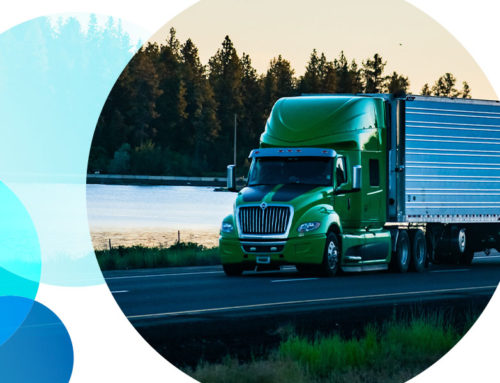If you are interested in starting or working for a trucking business, it’s important to know the details surrounding paying for fuel. Company truck drivers do not have to pay for their own gas, while truckers who operate in different capacities, like owner-operators, often pay out of pocket.
Jump To Section
However, how truckers pay for their fuel depends on many factors, including the type of truck they drive, the company they work for and where they are in their career. Let’s look at some of the most popular ways of fueling your truck so that you can choose what options best suit your operation.
How Do Truckers Pay for Gas?
Trucks need a lot of gas to journey from place to place. A full-size semi can burn through more than five gallons of gas per mile on the road. Fortunately, truckers have many fuel payment options to help them get from point A to point B, including:
1. Fuel Cards
Fuel cards, also known as fleet cards, are one of the most common ways truckers can pay for their own fuel. Functioning as charge cards that can be used at specific gas stations, fleet cards are convenient and easy to use, making them popular with both companies and individual truck drivers. Simply swipe your card and fill up your tank, then pay at a different time.
Benefits of fuel cards include:
- Increased cash flow: You can use the card as a charge card and pay for fuel at the end of the month. Or, you can preload amounts onto the card to pay as you go.
- Discounts: With a fuel card, you’ll have access to perks and fuel discounts that can help save you money on gas and truck-related expenses.
- In-depth reporting: By using accounting software with your fuel card, you can get reports, analysis and other financial information related to your use of the card, which saves time and effort.
2. Fuel Advances
Trucking fuel advances are a form of short-term working capital. Typically used to cover the gap between when a trucking company takes possession of a shipment and when they get paid for it, this option is ideal if you need cash quickly to finish delivering your load successfully.
Fuel advances allow truckers to:
- Take on more loads: With a trucking fuel advance, you can deliver more loads and increase your revenue stream without waiting for client payment.
- Avoid cash flow issues: Fuel advances eliminate the need to wait for a payment from your customer or take out a loan.
- Increase profits: If you experience a decrease in profits, a trucking fuel advance can help improve your bottom line by reducing costs associated with fuel purchases and extending your fleet’s operational range.
3. Fuel Surcharges
A trucking fuel surcharge is a fee added to the cost of shipping goods by truck to offset the rising fuel costs. The surcharge amount may vary depending on the size of your shipment and other factors. Billed to shippers, fuel surcharges are not uniform and can vary widely depending on where the goods ship, the kind of delivery service involved and even how far in advance the shipment is booked.
Fuel surcharges can:
- Help reduce risk: These charges help trucking companies account for fluctuating fuel costs, which can be unpredictable. With these charges, you can ensure you continue making a profit on your jobs.
- Increase your bottom line: If your trucks run more efficiently than your fuel surcharges account for, your trucking company can make more money.
4. Fuel Contracts
A trucking fuel contract is an agreement between a fleet and wholesale fuel providers that allows the fleet to lock in a certain volume of fuel and price for, on average, one to two years.
Fuel contracts offer many advantages for trucking companies, including:
- Keep costs low: Many truckers operate under fuel contracts to avoid volatility in the market and keep their costs competitive.
- Plan ahead: Fuel contracts with providers allow your fleet to plan ahead because you will know what your fuel expenses will look like over a specific period. With this consistent insight into fuel costs, you can better determine how much money you will spend on fuel and how it might affect other parts of your trucking business.
- Gain control over fuel costs: With a contract in place, your fleet will get consistent fuel price quotes from your suppliers that you can rely on throughout the contract period.

Different Types of Truckers and How They Purchase Fuel
Every trucker is unique. As a result, factors such as the type of trucking company you work for, your routes and your preferences all impact how you purchase fuel.
Owner-Operators
Owner-operators are independent contractors who own and operate their own vehicles. Since they run their own business, owner-operators hold responsibility for maintaining their vehicle, paying for fuel and ensuring they meet all of their state’s requirements.
Since owner-operators typically pay for fuel out of pocket, they often take advantage of the many discounts accompanying fuel cards. When an owner-operator needs extra capital, they can easily turn to fuel advances to cover more loads.
Individual Truck Drivers
Individual truck drivers work for a company as an employee or as an independent contractor. In this case, the company will pay for fueling and maintenance costs.
Truck drivers who work for a company often receive their wages regularly, with fuel reimbursements included in each one. Other individual truck drivers receive a company fuel card that allows them to use company funds for fuel on their own time and at locations of their choosing, without paying any costs out of pocket.
Fleets
A fleet is a large number of trucks that a single company owns. The fleet owner hires individual drivers to operate these trucks and is responsible for fueling them and taking care of any repairs that need to happen.
Fleets often pay for fuel in several different ways, depending on the business model and the choices their managers make, including:
- Purchasing fuel directly from suppliers at a negotiated price through fuel contracts.
- Reimbursing employees for their driving expenses during pay periods.
- Using fuel cards administered by a third party or provider to gain additional discounts, accounting software and more benefits.
About Porter Freight Funding
If you run a trucking operation, finding the funds you need to keep your business moving forward can pose a challenge. With Porter Freight Funding, we provide freight factoring services that can help you get the cash you need without waiting for payment on your invoices.
When you work with Porter Freight Funding, you’ll gain access to:
- Discounted fuel at stations within our network.
- Knowledgeable customer service representatives standing by to help you the moment challenges arise.
- Dispatch networking solutions to allow you to focus on deliveries.
Sign Up for Our Fuel Program
If you’re a truck driver, you know how important it is to keep your fuel costs low. Luckily, Porter Freight Funding can help.
We’ll work with you to find the best option for your business needs, whether that looks like fuel cards, load advances or one of our other services that will help improve your bottom line. Learn more about our fuel card program and apply for a free quote today!



